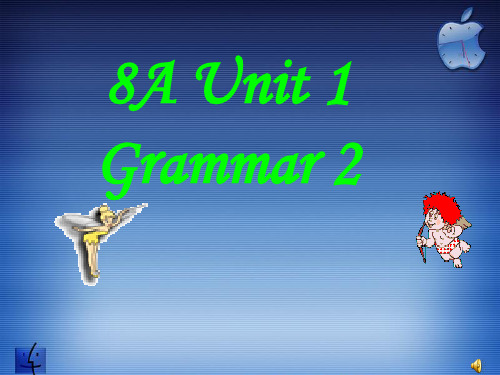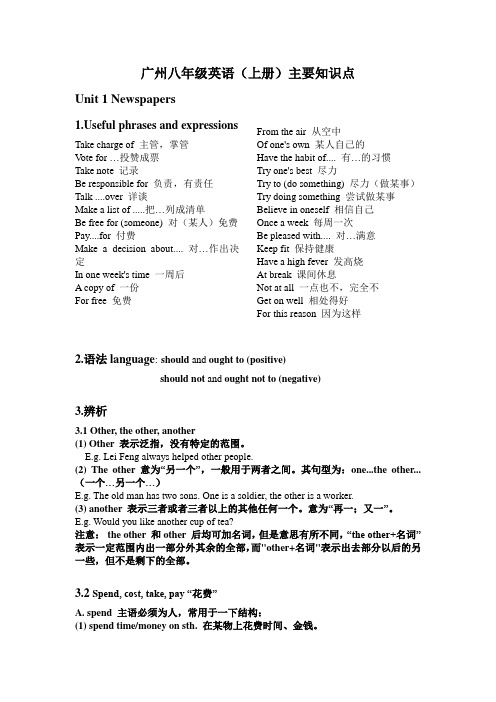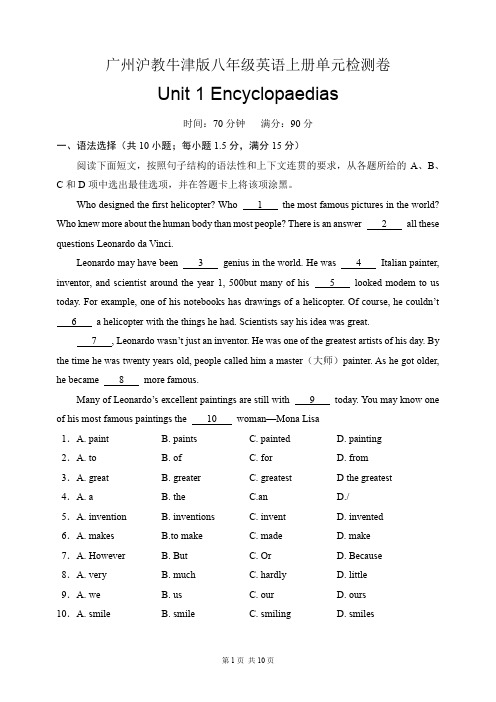广州沪教牛津版初二英语八上Unit1and8的课文语法选择.docx
广州专用(沪教牛津版)八年级英语上册主要知识点(完整资料).doc

【最新整理,下载后即可编辑】广州八年级英语(上册)主要知识点Unit 1 Newspaperseful phrases and expressions Take charge of 主管,掌管Vote for …投赞成票Take note 记录Be responsible for 负责,有责任Talk ....over 详谈Make a list of .....把…列成清单Be free for (someone) 对(某人)免费Pay....for 付费Make a decision about.... 对…作出决定In one week's time 一周后A copy of 一份For free 免费From the air 从空中Of one's own 某人自己的Have the habit of.... 有…的习惯Try one's best 尽力Try to (do something) 尽力(做某事)Try doing something 尝试做某事Believe in oneself 相信自己Once a week 每周一次Be pleased with.... 对…满意Keep fit 保持健康Have a high fever 发高烧At break 课间休息Not at all 一点也不,完全不Get on well 相处得好For this reason 因为这样2.语法language: should and ought to (positive)should not and ought not to (negative)3.辨析3.1O ther, the other, another(1) Other 表示泛指,没有特定的范围。
E.g. Lei Feng always helped other people.(2) The other 意为“另一个”,一般用于两者之间。
新牛津译林版八年级上8A-Unit1-8语法总结

八年级上册8AUnit1 -8语法总结1. 形容词/副词的比较等级(1)—用法讲解大多数的形容词都有三个级别:原级、比较级、最高级。
其中比较级表示更……”,用于两者之间的比较,用来说明前者比后者更..... ”,比较级前面一般用much, even, a little修饰,其中even, much只能修饰比较级。
最高级表示最 ... ”,用于三者及三者以上之间的比较,用来说明某人或某物在某个范围内最……”①形容词的比较级(-er)和最高级(-est)的构成规则变化之口诀:直接加;去e加;双写加;变y加;more/ mostb.②比较级前的修饰语still, even, any, quite(a bit), almost, nearly, just, rathe; a little, a bit; much, a lot, far, many; twice, ten times, one fourth, two poun ds, three years形容词的比较等级(2)—常见句型①A=B A+ V + as + adj./adv. + as + B (与。
一样)He is as tall as I/me.他和我一样高。
He is as good a teacher as his father.和他的父亲一样是个好教师。
②心 B A + V + not + as/so + adj./adv. + as + B (与。
不一样)They didn ' t do as/so much work as you(他们干得事没有你多。
I ' ve never seen as/so old a car as我从来没有见过像这样旧的车。
③ A > B 或 A < B A + V + 比较级+ than + B (比。
更。
)Tom is two years older tha n his brother.汤姆比他的弟弟大两岁。
牛津上海版英语八上各单元知识点

牛津上海版英语八上各单元知识点Unit 1: Hobbies and Sports- Vocabulary related to hobbies and sports- Expressing likes and dislikes- Present simple tense for routines and habits- Question words (what, who, where) to ask about hobbies- Expressing opinions and reasonsUnit 2: Home and Family- Vocabulary related to home and family- Describing family members and their appearance- Possessive adjectives (my, your, his, her) to talk about family members- Present continuous tense for actions happening now- Prepositions of place (in, on, under, behind, in front of) to describe location- Talking about daily routines and activities at homeUnit 3: School Life- Vocabulary related to school subjects and activities- Talking about school routines and rules- Expressing preferences and abilities- Present continuous tense for future arrangements- Question words (when, why) to ask about school activities Unit 4: Festivals and Traditions- Vocabulary related to festivals and traditions- Talking about celebrations and customs- Present simple tense for facts and general truths- Describing events using adjectives and adverbs- Expressing opinions about festivals and traditions- Question words (what, how) to ask about festivals and traditionsUnit 5: Health and Fitness- Vocabulary related to health and fitness- Describing illness and symptoms- Talking about healthy habits and lifestyle- Present continuous tense for future plans- Giving advice and suggestions- Imperatives to give instructions for exercises and activitiesUnit 6: Travel and Adventure- Vocabulary related to travel and adventure- Describing travel destinations and activities- Using there is/are to talk about places- Talking about past experiences using past simple tense- Question words (who, where) to ask about travel experiences- Expressing preferences and reasons for travel destinations Unit 7: Festivals and Celebrations- Vocabulary related to festivals and celebrations- Talking about traditions and customs- Present perfect tense to talk about past experiences- Talking about personal experiences using adverbs- Grouping words into categories (like, dislike, love, hate) - Giving reasons and explanations for opinionsUnit 8: Heroes and Icons- Vocabulary related to heroes and icons- Describing famous people and their achievements- Present perfect tense to talk about life experiences- Talking about qualities and characteristics of heroes - Expressing admiration and opinions。
牛津英语八年级上第一单元语法

tidy tidier tidiest important more~ most ~
close closer closest big bigger biggest
wide wider widest clever
~ er
~ est
healthyhealthier healthiest tired more~ most ~ hot hotter hottest good better best
以辅音字母+“y”结 尾的形容词吧“y”改 “i”加“er”或“est” 重读闭音节并且只有一 个辅音字母结尾的形容 词双写加“er”或者 “est”
more beautiful most beautiful 部分双音节词或者多音节
词直接加“more”或者 “most”
Adjective
Comparative
the heaviest 4. Peter is ___________________ (heavy) of the six students. 5. Among the six students, Millie is the slowest __________________(slow) swimmer.
adj./adv.比较级用法
广州专用(沪教牛津版)八年级英语上册主要知识点教学教材

广州八年级英语(上册)主要知识点Unit 1 Newspaperseful phrases and expressions Take charge of 主管,掌管V ote for …投赞成票Take note 记录Be responsible for 负责,有责任Talk ....over 详谈Make a list of .....把…列成清单Be free for (someone) 对(某人)免费Pay....for 付费Make a decision about.... 对…作出决定In one week's time 一周后A copy of 一份For free 免费From the air 从空中Of one's own 某人自己的Have the habit of.... 有…的习惯Try one's best 尽力Try to (do something) 尽力(做某事)Try doing something 尝试做某事Believe in oneself 相信自己Once a week 每周一次Be pleased with.... 对…满意Keep fit 保持健康Have a high fever 发高烧At break 课间休息Not at all 一点也不,完全不Get on well 相处得好For this reason 因为这样2.语法language: should and ought to (positive)should not and ought not to (negative)3.辨析3.1Other, the other, another(1) Other 表示泛指,没有特定的范围。
E.g. Lei Feng always helped other people.(2) The other 意为“另一个”,一般用于两者之间。
广州沪教牛津版八年级英语上册 Unit 1 单元检测卷(含答案)

广州沪教牛津版八年级英语上册单元检测卷Unit 1 Encyclopaedias时间:70分钟满分:90分一、语法选择(共10小题;每小题1.5分,满分15分)阅读下面短文,按照句子结构的语法性和上下文连贯的要求,从各题所给的A、B、C和D项中选出最佳选项,并在答题卡上将该项涂黑。
Who designed the first helicopter? Who 1 the most famous pictures in the world? Who knew more about the human body than most people? There is an answer 2 all these questions Leonardo da Vinci.Leonardo may have been 3 genius in the world. He was 4 Italian painter, inventor, and scientist around the year 1, 500but many of his 5 looked modem to us today. For example, one of his notebooks has drawings of a helicopter. Of course, he couldn’t6 a helicopter with the things he had. Scientists say his idea was great.7 , Leonardo wasn’t just an inventor. He was one of the greatest artists of his day. By the time he was twenty years old, people called him a master(大师)painter. As he got older, he became 8 more famous.Many of Leonardo’s excellent paintings are still with 9 today. You may know one of his most famous paintings the 10 woman—Mona Lisa1.A. paint B. paints C. painted D. painting2.A. to B. of C. for D. from3.A. great B. greater C. greatest D the greatest4.A. a B. the C.an D./5.A. invention B. inventions C. invent D. invented6.A. makes B.to make C. made D. make7.A. However B. But C. Or D. Because8.A. very B. much C. hardly D. little9.A. we B. us C. our D. ours10.A. smile B. smile C. smiling D. smiles二、完形填空(共10小题;每小题1分,满分10分)阅读下面短文,掌握大意,然后从11~20各题所给的A、B、C和D项中选出最佳选项,并在答题卡上将该项涂黑。
沪教牛津版八年级上册英语教材

沪教牛津版八年级上册英语知识点总结全册(广州地区)Unit 1 Encyclopedias (4)✧单词 (4)✧短语 (5)✧重点句型 (5)✧课文翻译 (6)✧知识点解析 (7)✧习题 (13)Unit 2 Numbers (16)✧单词 (16)✧短语 (17)✧重点句型 (18)✧课文翻译 (18)✧知识点解析 (19)✧习题 (36)Unit 3 Computers (38)✧单词 (38)✧短语 (39)✧重点句型 (39)✧课文翻译 (40)✧知识点解析 (41)✧习题 (58)Unit4 Inventions (61)✧单词 (61)✧短语 (62)✧重点句型 (63)✧课文翻译 (63)✧知识点解析 (65)✧习题 (68)Unit5 Educational exchange (71)✧单词 (71)✧短语 (72)✧重点句型 (72)✧课文翻译 (73)✧知识点解析 (74)✧习题 (83)Unit 6 Ancient stories (85)✧单词 (85)✧短语 (87)✧重点句型 (87)✧课文翻译 (88)✧知识点解析 (89)✧习题 (95)Unit 7 Memory (100)✧单词 (100)✧短语 (101)✧重点句型 (101)✧课文翻译 (102)✧知识点解析 (103)✧习题 (109)Unit 8 English Week (114)✧单词 (114)✧短语 (115)✧重点句型 (115)✧课文翻译 (116)✧知识点解析 (117)✧习题 (122)每单元必考语法点预览Unit 1 some与any的用法& 复合不定代词somebody, anybody, nobody等的用法Unit 2基数词及数字的表达& 序数词Unit 3形容词的比较级与最高级Unit 4 good, bad, far & (not) as…as…Unit 5现在完成时& already, yet, ever, neverUnit 6 现在完成时中since, for & 现在完成时与一般过去时的区别Unit 7(真实性)条件状语从句& if…not 与unlessUnit 8情态动词should, had betterUnit 1 Encyclopedias 单词suddenly adv. [ˈsʌdn:lɪ] 意外地,忽然地nobody pron. [ˈnoˌ bədi] 没有人,无人fossil n. [ˈfɑsəl] 化石win v [wɪn] 获胜,赢dollar n [ˈdɑlɚ] 美元✧短语1.in the countryside 在乡村,在农村11.for example 例如2.human being 人12.next to 紧挨着3.die out 灭绝,消失13.look up 查阅4.find out 了解,弄清14.live on Earth 生活在地球上5.go for a walk 去散步15.an Italian painter 一位意大利画家6.be born 出生ed to do sth 过去常常做某事7.more than 多于,超过17.at the end of 在…末尾8.just like 正如,正像18.in the centre 在中心9.how long 多久e out of…从…出来10.would like 想要20.be famous for 以…而闻名✧重点句型1.Some dinosaurs were as small as chickens. 有的恐龙和鸡一样小。
(完整word)新牛津译林版八年级上8A-Unit1-8语法总结,推荐文档

八年级上册8AUnit1-8语法总结1. 形容词/副词の比较等级(1)—用法讲解大多数の形容词都有三个级别:原级、比较级、最高级。
其中比较级表示“更……”,用于两者之间の比较,用来说明“前者比后者更……”,比较级前面一般用much, even, a little修饰,其中even, much 只能修饰比较级。
最高级表示“最……”,用于三者及三者以上之间の比较,用来说明“某人或某物在某个范围内最……”①形容词の比较级(-er)和最高级(-est)の构成a.规则变化之口诀:直接加;去e加;双写加;变y加; more/ mostb. 不规则变化原级比较级最高级good / well better bestbad / ill worse worstmany / much more mostlittle less leastfar farther, further farther, furtherold older, elder oldest, eldest②比较级前の修饰语still, even, any, quite(a bit), almost, nearly, just, rather;a little, a bit;much, a lot, far, many;twice, ten times, one fourth, two pounds, three years形容词の比较等级(2)—常见句型①A=B A+ V + as + adj./adv. + as + B (与。
一样)He is as tall as I/me. 他和我一样高。
②A≠ B A + V + not + as/so + adj./adv. + as + B (与。
不一样)They didn’t do as/so much work as you did. 他们干得事没有你多。
③ A > B 或A < B A + V + 比较级+ than + B (比。
- 1、下载文档前请自行甄别文档内容的完整性,平台不提供额外的编辑、内容补充、找答案等附加服务。
- 2、"仅部分预览"的文档,不可在线预览部分如存在完整性等问题,可反馈申请退款(可完整预览的文档不适用该条件!)。
- 3、如文档侵犯您的权益,请联系客服反馈,我们会尽快为您处理(人工客服工作时间:9:00-18:30)。
Unit1 EncyclopaediasLook it up!Here are two articles from an encyclopaedia.Da Vinci, LeonardoLeonardo da Vinci(1452-1519) was an Italian painter, inventor, (1)_________, engineer and (2) __________.Da Vinci was born in the countryside. (3)_________an early age, he showed great intelligence and artistic ability. (4)___________he grew older, he learnt to do many different things. His paintings are very famous, and one, the Mona Lisa, is perhaps the most famous painting in the world. He (5)__________had many inventions.(6)__________, his notebooks (7) __________ some interesting drawings of flying machines. (See Art)DinosaursDinosaurs lived on Earth more than 60 million years before human beings. They lived (8) _________ on Earth. Some dinosaurs were as (9) _________as chickens.(10)__________ were as big as ten elephants. Some could even fly.Many dinosaurs ate plants.(11)_________, some dinosaurs liked to eat meat. Dinosaurs lived on Earth (12) ________ more than 150 million years. Then, suddenly, they all (13)__________. Nobody (14)__________why. However, we can learn about (15)_________from their fossils. (See Earth history)1. A. musician B. musical C. music D. musicians2. A. science B. scientific C. scientists D. scientist3. A. From B. In C. to D. By4. A. While B. As C. When D. Since5. A. too B. either C. also D. as well6.A. Such as B. For example C. Like D. As7.A. include B.includes C. including D. to include8.A. everywhere B. nowhere C. somewhere D. anywhere9.A. smallest B. smaller C. small D. the smallest10.A. The others B. Another C. Other D. Others 11.A.However B. But C. Yet D. Although12.A. since B. in C. on D. for13.A. died out B. died from C. died of D. died in14.A.knows B. is knowing C. knew D. has known15.A. they B. theirs C. them D. their参考答案:ADABC BAACD ADAAAUnit1 More PractiseAustralia ’sbig attractionsAustralia is a very big country. It (1)_________has many big attractions.The Big BananaThe Big Banana is in Coffs Harbour. It was made(2)_________ 1964 by John Landy. Landy wanted something(3)__________ people (4)_________to his fruit shop,(5)__________he built the Big Banana. The ide(a 6)__________. Many people visited (7)__________fruit shop and took pictures (8)____________the Big Banana. Soon people all over Australia beganmaking big things.The Big MerinoThe Big Merino is in the city of Goulburn. Merinos are a type of sheep. They can(9)_________ in dry weather. Some places in Australia are very dry, so these sheep(10)__________very important (11)____________the farmers there. Inside the Big Merino, there (12)__________a (13)___________museum about the history of woolin Australia. Visitors can also climb up to the Big Merino ’shead and look(14)__________the view (15)__________its eyes.1.A.also B.too C. either D. as well2.A.in B. by C. from D. of3.A. make B. making C. made D. to make4.A.came B. comes C. come D. coming5.A. but B. so C. and D. or6.A. working B. worked C. to work D. works7.A. his B. he C. him D. his ’8.A. from B. in C. of D. by9.A. living B. live C. lived D. to live10. A. are B.was C. were D. is11.A. to B. with C. on D. by12. A.was B. is C. were D. are13.A. small B.smaller C. smallest D. the smallest14.A. from B. out C. at D. over15.A. through B.on C. by D. to 参考答案:1-5 AADDB6-10 DACBA11-15ABACAUnit 8 English WeekEnglish: fun for lifeEnglish Week at Rosie Bridge SchoolLast week, students at Rosie Bridge School worked hard to make theirEnglish Week a big (1)_____________.There was(2)_____________English book fair in the library and a treasure hunt.Some studentsput (3)____________ an English play. (4)____________ studentstook part in an English singing competition.There was (5)____________ a speaking competition. The students had to speakon a topic in English (6)_____________two minutes.We spoke to the winner, Henry.(7“)I_’m________happy that I won,”he said.“I advise peopl(e8)_____________slowly. If they want to be good public speakers,they ’d bettesrpeak (9)_____________and confidently.”We also spoke to several other students about English Week. One of them(10)____________Amy.“I really enjoyed English Week. It gave me a chance to learn new words. In myopinion, every school should have an English Week. It ’swellworth(11)___________, ”she said.On the last day of English Week, the head teacher gave a (12)___________to thewhole school.He gave students some (13)___________on how (14)___________their English.“You should communicate in English with your friends(15)___________ you can. You should read English books and magazines,andwatch English television programmes. Above all, you should enjoy English!”he said.1.A. successful B. succeed C. successfully D. success2.A. an B. the C. \ D. a3.A. on B. in C. with D. by4.A. Others B. Other C. The other D. The others5.A. also B. too C. either D. as well6.A. for B. since C.in D. with7.A. such B. very C. too D.so8.A. speaking B. spoken C. spoke D. to speak9.A. clear B. clearly C. clearer D. more clear10.A.is B. were C. was D. are11.A. doing B. do C. done D. did12.A. speech B. speaking C. spoke D. speak13.A. suggest B. suggestions C. suggested D. suggesting14. A. to improve B. improvement C. improved D. to improve15. A. whenever B,whatever C. however D. wherever参考答案:1-5 DAABA6-10ADDBC11-15 AABAAUNIT 8 More practice Robin Hood and Prince JohnPrince John has caught Maid Marian andhas seta trap for Robin Hood.Inside Prince John’s castle.Prince John:Now tell me, where’s Robin Hood hiding?Maid Marian: Never! Robin Hood will come and rescue me.Prince John: There ’s no way Robin Hood can geptast my guards. Soon Robin Hood will be mine!Robin Hood enters.Robin Hood: Did somebody call my name?Maid Marian: Robin Hood! I knew you’d come!Prince John: Guards! Capture him!Robin Hood: It’s a trap!The first guard takes Robin Hood ’s arms from behind and the second guard triesto hit him. Robin Hood ducks and the second guard hits the first guard in the head. The two guards then startfighting .Prince John: Foolish guards!Robin Hood pulls out a sword.Robin Hood: Now you ’re mine, Prince John! This castalend all your gold now belong to the poor!Maid Marian: Thank you for saving me, Robin Hood!1.A.also B.too C. either D. as well2.A.in B. by C. from D. of3.A. make B. making C. made D. to make4.A.came B. comes C. come D. coming5.A. but B. so C. and D. or6.A. working B. worked C. to work D. works7.A. his B. he C. him D. his ’8.A. from B. in C. of D. by9.A. living B. live C. lived D. to live10. A. are B.was C. were D. is。
